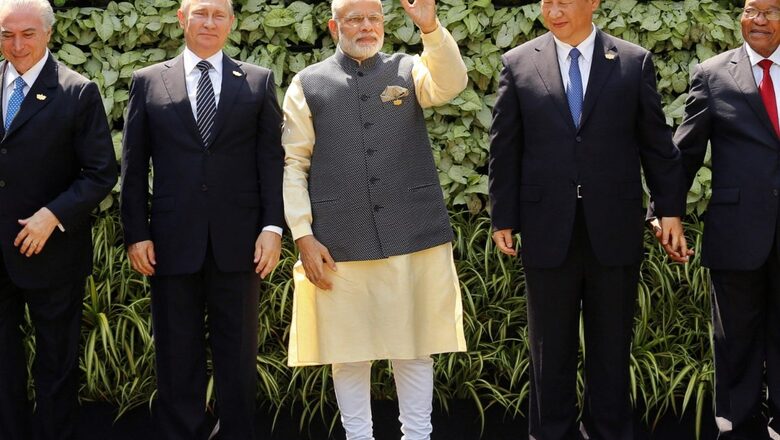
views
The 2023 BRICS (Brazil, Russia, India, China, South Africa) Summit is scheduled to be held from September 22 to 24 in Johannesburg, South Africa. Pre-Summit deliberations show that there are some unique and significant developments to look out for.
For one, Russian President Vladimir Putin will skip the summit for the first time on account of an International Criminal Court warrant issued against him, which makes him liable to be arrested for a war crimes trial upon his visit to South Africa. The other is the expansion of BRICS, which is set to be taken up for an elaborate discussion at the summit.
Interestingly, the expansion of BRICS to include new member countries isn’t just the novel acronym they would likely have to come up with, but also why over 40 countries have expressed interest to be part of it. Then there is the issue of the induction criteria for new members, and how such an expansion, if successful, would impact existing members.
The precedent for the formalisation of BRICS expansion lies in the creation of a ‘BRICS-Plus Circle’ at the 2017 Summit, where China invited Egypt, Kenya, Tajikistan, Mexico, and Thailand with an aim to promote openness, inclusiveness and cooperation between BRICS member countries and other emerging market economies and developing countries. Before that, in 2016, India had invited Bangladesh, Bhutan, Nepal, Thailand, Myanmar, and Sri Lanka to attend the summit.
Since then, not only has expansion been a part of the agenda across summits, but the BRICS New Development Bank (NDB) has also included three new member states under its financing ambit – Bangladesh, United Arab Emirates, and Egypt.
Ahead of the 2023 Summit, countries such as Saudi Arabia, the UAE, Bahrain, Argentina, Algeria, Egypt, Iran, and Indonesia have formally applied to be BRICS members. There are reportedly many more on the list. And this is despite all of BRICS’s shortcomings. Not to mention, there is a lot of scepticism regarding China’s sustained emphasis on expansion.
Analysts argue that other BRICS members, India in particular, are wary of China using the expansion route to create a loyalist bloc of its own within the organisation. Similarly, both India and Brazil have advocated a cautious approach toward expansion, with India arguing in the Beijing Declaration at the 2022 Summit that there need to “clarify the guiding principles, standards, criteria and procedures for this expansion process,” with “full consultation and consensus.”
Brazil, in particular, wanted to invite Venezuela to be part of the BRICS Outreach Session at the 2019 Summit, but because the other members did not recognize Venezuelan President Juan Guaidó at the time, they refused. Exposing internal fault lines, Brazil cancelled the Outreach Summit.
So why are countries still applying to join BRICS?
There are a few reasons other developing economies may want to be part of the grouping. First is the prestige and brand name attached to BRICS. In 2022, Brazilian Minister for Foreign Affairs Mauro Vieira said: “BRICS is a brand and an asset, so we have to take care of it, as it means a represents a lot.” The statement sheds light on the value BRICS members assign to the organisation’s image as a representative of developing economies.
Naturally, Global South countries that are vying for a greater say in global governance may find merit in membership of such an organization. For example, analysts argue that because Mexico, which has expressed interest in joining BRICS, fears military intervention from the US in its cartel wars, being part of the grouping may eventually earn it a sense of security, while also fostering its global influence.
Secondly, there are multiple economic opportunities that accompany membership in BRICS. For example, new members may find it easy to access India and China’s large markets.
They would also be able to access funding from the NDB and other intra-BRICS economic mechanisms such as the Interbank Cooperation Mechanism (ICM). Established at the 2013 BRICS Summit in Durban, ICM allows member countries to settle payments and finance investments in local currencies. Even the NDB has announced that as part of its 2022-2026 strategic cycle, 30 per cent of the Bank’s total financing volume will be denominated in local currencies of its members.
For countries facing economic difficulties in the aftermath of Western sanctions against Russia amidst the war in Ukraine, and are otherwise also subject to sanctions by the US and its allies (such as Iran), access to capital under such mechanisms may alleviate some of their woes.
And finally, there is a sense of equality between countries that comes with a BRICS membership. Because the grouping has a flat hierarchy, there is consensus and equal say on all matters, and any finalised decision is the best common minimum all member countries agree on.
Of course, with the inclusion of new members, the process will likely become more elaborate and complex. But decisions taken will also be more representative of the wishes of emerging markets and economies. It is precisely also this consensus-based decision-making that insulates the process of expansion from influence-peddling by the Chinese or the Russians.
How might it impact current members?
Many of the existing BRICS member countries have reason to shun expansion. For India, it may be suspicion regarding China’s inclusion of countries economically indebted to it, and therefore more likely to be influenced by Chinese actions.
For South Africa, it may be that the inclusion of countries with significantly more economic output worth than its own US$400 billion – such as Mexico, Indonesia, or Argentina – may reduce its value as one of the five initial BRICS members. For Brazil, it may be that the cohesion of the grouping will be further undermined by the introduction of new members, and the overall prestige of this exclusive grouping could potentially diminish.
At the same time, Russia and China may find partners within the expanded grouping that can help advance their increasingly vocal anti-West agenda, including in other multilateral institutions. Russia is especially in need of support from as many countries as possible amidst its tarnished image owing to the Ukraine war.
As the process of the grouping’s expansion is underway, India’s priorities would lie in making sure that principled guidelines are laid out to set benchmarks for membership, in creating space for consensus-building against the possibility of Chinese influence-peddling, and in attempting to retain the image and brand value of BRICS as a community of developing market economies demanding more voice in global governance.
The author is Research Analyst at The Takshashila Institution. Views expressed in the above piece are personal and solely that of the author. They do not necessarily reflect News18’s views.




















Comments
0 comment